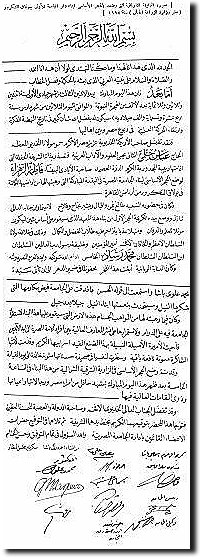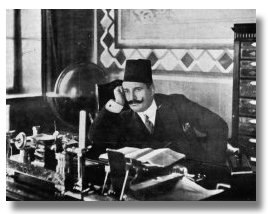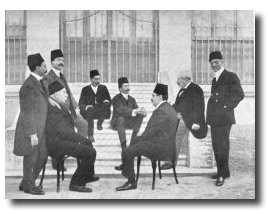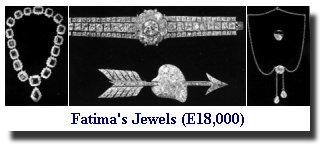|
Cairo University Historical snapshots Part (1)
Go to part 2 >>
The Beginning:
On March 31, 1914; Husayn Rushdi, minister of Justice and the
University Rector was speaking at the university's ground ceremony for a new building,
he said:
"On the eastern side of Cairo, al-Azhar has stood for nearly a 1000 years. It has
been a lofty beacon sending light all directions and immortalizing the sciences
of the Arabs and the civilization of Islam. Now here is the new university which
will be built in the age on the western side of the city to spread Arabic sciences
together with Western learning. These twin brothers will cooperate henceforth in
enlightening both banks of the blessed Nile, from the right and from the left, in
the things which will restore the people of the valley to complete well-being and
full glory"
The Egyptian University:
As a major offshoot of the national Egyptian movement that goes
back to the beginning of the century, a number of national leaders, enlightenment
pioneers and social thinkers called for the establishment of an Egyptian university.
In the beginning of this century, social thinkers like Mohammed abdu, Mostafa Kamel,
Mohammed Farid, Kasem Amine and Saad Zaghloul called for the establishment of an
Egyptian University to be a lighthouse of liberal thought and the basis of
a comprehensive academic revival in all fields of knowledge in order to be
able to cope with the international scientific and academic advancement.
Origin of the university idea:
At least five different parties; claim to have planted the seed
of the Egyptian University. Royalists; Prince Ahmad Fuad. Nationalists with Watanist
affinities pressed Mustafa Kamil's claims, Umma Party and the Wafd; which have emphasized
the contributions of Saad Zaghlul, Qasim Amine, and Muhammed Abduh.
But early suggestions came from the Armenian bureaucrat Yaqub Artin and the Syrian
journalist Jurji Zaydan. In 1894 Yaqub Artin; suggested that the existing higher
professional school could well provide the basis for a university. Jurji Zaydan
had two models in his mind for the new university.
In 1900 al-Hilal; called for an "Egyptian College School" to provide
home-grown modern higher education in Arabic, so that Egyptians would not have to
go to Europe. The other model was the Syrian Protestant College which American missionaries
had founded in Beirut.
In 1908, Mustafa Kamil and Qasim Amin died, and Khedive Abbas
took the project of the university under his wing naming his son Crown Prince Abd
al-Munim as honorary head. Then he considered four other princes: Husayn Kamil,
Umar Tusun, Muhammed Ali, and Ahmed Fuad; or the actual leadership of the university.
Only Fuad was both willing to serve and acceptable to the British. He was named
for the post late in 1907. Abbas assigned the university E5,000 annually from the
Awqaf Department which, unlike the rest of the state budget, was still under his
personal control.

Prince Ahmed Fuad (The first Rector of the Egyptian University)
Page Top
 Prince Ahmed Fuad (1st rector of the EU)
Prince Ahmed Fuad (1st rector of the EU)
Fuad was born on 1868. Year after his birth his father Khedive
Ismail attempted to dazzle European royalty at the opening of the Suez Canal in
1869. He accompanied his deposed father into Italian exile ten years later. Fuad
was a Machiavellian by instict. He shared his father Ismail's apprecian for culture,
or at least for what cultural patronage could do for a prince's image. Schooled in
Geneva and the Turin military academy, Prince Fuad obtained a commission in the
Italian army.
His father got on well with King Umbert and Queen Margherita, and Fuad befriended
their son, the future Victor Emmanuel III. Fuad learned Turkish at home, and his
schooling added French and Italian. Service as military attaché in Vienna enabled
him to pick up german.
While waiting for the throne, Fuad presided over organizations needing a royal sponsor.
He headed up an association for encouraging tourism and an "aviation week" at Heliopolis.
Less of a scholar than his brother Ibrahim Hilmi or his second cousin Umar Tuson,
Fuad was following Islamic as well as European Renaissance tradition in dispensing
cultural patronage. He headed an international first aid society and the Red Crescent
Society and revived the Geographical Society his father had founded. But the university
was the most important cultural achievement
as prince. It benefited from his connections
and his administrative energy. His university lectures, as befits a prince, were
confined to marksmanship and horsemanship.
Administrative Council of the
Egyptian University (May 1908)
By May 1908, the Royal Palace chose the administrative council
of the project of EU. Prince Fuad was rector, and palace employee Ahmed Zaki was
secretary. Council Members included Dr. Alwi Pasha (personal physician to Fuad's
sister Princess Fatima Ismail) and Yusuf Sadiq of the Khedive's Reform Party. Husayn
Rushdi, Ibrahim Najib, Abd al-Khaliq Tharwat, and Yaqub Artin were high-level bureaucrats
willing to work with the palace. Palace official Ahmed Shafiq later served as one
of the two vice rectors, and in 1912 the addition to the council of Ismail Sidqi
and Prince Yusuf Kamal.
 Administrative council of the Egyptian
University in 1909
Seated from right:Prince Ahmed Fuad,
Yaqub Artin; standing from right:Dr. M. Alwi, Mr. Masbero,;
Standing from left: Abd al-Khalik Tharwat,
Hassan Said Pasha, setting on steps:Aly Bahgat, Morkus Hana the Lawer
Administrative council of the Egyptian
University in 1909
Seated from right:Prince Ahmed Fuad,
Yaqub Artin; standing from right:Dr. M. Alwi, Mr. Masbero,;
Standing from left: Abd al-Khalik Tharwat,
Hassan Said Pasha, setting on steps:Aly Bahgat, Morkus Hana the Lawer
Princess Fatima Ismail, The donor of
largest Fund :


One of the most important contributions in funding the Egyptian
university was that of Princess Fatima Ismail (Fuad's sister). Urged by her physician
Dr. Alwi, she became the largest benefactor. She contributed 600 feddans of waqaf
land, jewels worth E18,000, in addition to six feddans for a campus near her palace
in Bulaq al-Dakrur, Giza.
|
Page Top |
Next: part 2
|
|